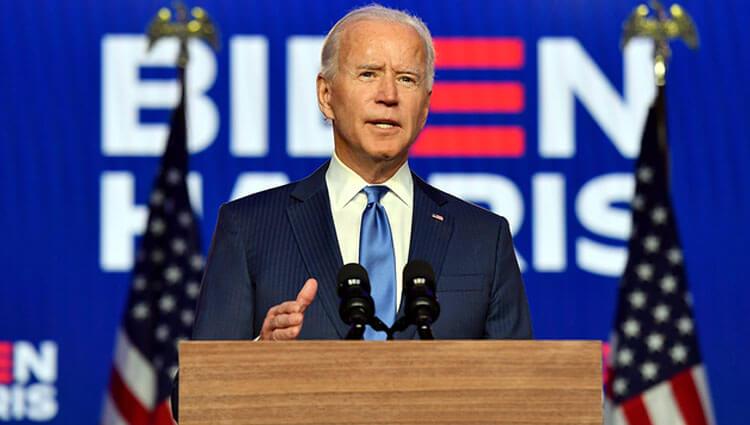By: Saleem Qamar Butt
In topping Trump in a race that was both upended and largely defined by the coronavirus, the Democratic nominee Joseph Biden has become the first challenger to defeat an incumbent first-term president in nearly 30 years by gaining the highest number of votes by any president in the history of America. With his victory, his running mate, California Sen. Kamala Harris, will become the first female vice president. Trump’s non-acceptance of results and resort to courts notwithstanding, Joe Biden seems all set to take the oath on 20th January 2021 and occupy White House with seemingly unlimited number of domestic and international challenges that call out for his attention.
As always, a lot of speculation is taking place with regards to Joe Biden’s prioritization of domestic and foreign policy challenges. Having been Obama’s vice president for eight years, his thoughts and record of action is well known and he is not a stranger at home or abroad; and has a reputation of being an establishment’s man.
During his campaign Joe Biden frequently used the rhetoric that the United States was prepared to lead again, not just with the example of power but also with the power of example. However, keeping Obama 8 years legacy and above stated gist of views expressed, one can expect a lot of damage control measures on the one hand but potential fall back to policies instituted and followed in the last tenure on the other hand. If one is to learn a lesson from past experience, Biden would be well advised to immediately shed away unenviable past record like the excessive use of torture, armed drones and military muscles causing massive civilians casualties in Afghanistan, Pakistan, Iraq, Libya, Syria and Yemen.
He also categorically promised during his campaign to address Islamophobia, treat Muslims in American on equality basis and to immediately reverse the Trump administration’s cruel and senseless anti-immigration policies and remove the travel ban as well. Furthermore, he claimed to set annual refugee admissions at 125,000, and is seeking to raise it over time. However, besides the COVID-19 challenge, the most immediate step expected by Biden is to address the ever widening gulf between white supremacists and the non-white American population. The internal challenges facing the USA go well beyond its physical and economic health. The United States is a country that is divided. More than 70 million Americans voted for Donald Trump, and many of them will buy into his destructive narrative that the election was stolen and believe that Biden is an illegitimate president.
In view of the domestic challenges, Biden is expected to follow a policy of facilitating Americans to succeed in the global economy—with a foreign policy for the middle class. For that, China will remain America’s number one economic challenge and to win the competition against China or anyone else, the US will rely on sharpening its innovative edge and will try to unite the economic might of like minded democracies. For that we may see the revival of the World Trade Organization’s (WTO) dispute settlement system to get back to work in addition to coordination with the EU, Japan, Canada, Australia, and others to address the WTO’s weaknesses.
Biden is also likely to reinforce his economic and security partnership with Europe by reinvigorating Transatlantic Trade and Investment Partnership (TTIP), giving away undue thinning out from Germany and strengthening NATO to take care of resurgent Russia. Nevertheless, Biden despite being tough with China, is expected to follow Obama’s rational policy line according to which the US is to cooperate where it can and compete where it must. Biden is also prone to revive the Iran nuclear deal to stop Iran from acquiring nuclear weapons.
In the larger regional security domain, Obama-Biden Asia Pacific Rebalancing Policy, which resulted in the latest Quad Group alliance tipped to become Quad Plus or a mini NATO in the region, is likely to be considered to be a bipartisan and establishment strategy to deal with both China and Russia. Thus, India is prone to remain America’s strategic ally and its consequent military muscles building will continue to bleed India economically, disturb regional stability and threaten Pakistan before it threatens any other country. It will also remain to be seen as to how will Biden and Harris fulfill their concerns and good wishes expressed during election campaign regarding people suffering under Indian occupation in Illegally Occupied Jammu and Kashmir (IOJK).
American disdain for Chinese BRI and CPEC projects, as well as Pakistan’s place in it, is likely to keep Pakistan under duress by FATF and other IFIs. As Biden is likely to follow up Trump’s policy of disengagement from all unending wars like the ones in Afghanistan, Syria and Yemen including support to KSA. Instead, emphasis will shift to use of small scale special forces, high tech weapons and pushing the regional stakeholders to take care of the details –a smart solution. Therefore, Pakistan is likely to stay relevant and may be off the hook, to a degree, until America can withdraw and return relative peace in Afghanistan.
To keen eyes, the scenario may seem familiar looking back at 2010-2017. For Pakistan, not much change or comfortable news; the only available safety zone is adjusting in the evolving regional and extra regional security and economic alliances without getting trapped once again in a conflict on any one’s behalf.
Published in Daily The Nation







